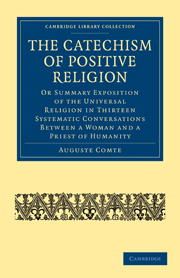 The Catechism of Positive Religion
The Catechism of Positive Religion Book contents
- Frontmatter
- PREFATORY NOTE TO THIRD EDITTON
- Contents
- PREFACE
- POSITIVIST LIBRARY
- HINT TO THE READER
- INTRODUCTION
- CONVERSATION I General Theory of Religion
- CONVERSATION II Theory of Humanity
- First Part EXPLANATION OF THE WORSHIP
- Second Part EXPLANATION OF THE DOCTRINE
- Third Part EXPLANATION OF THE REGIME, OR SYSTEM OF LIFE
- CONCLUSION: GENERAL HISTORY OF RELIGION
- TABLES
CONVERSATION I - General Theory of Religion
Published online by Cambridge University Press: 05 October 2010
- Frontmatter
- PREFATORY NOTE TO THIRD EDITTON
- Contents
- PREFACE
- POSITIVIST LIBRARY
- HINT TO THE READER
- INTRODUCTION
- CONVERSATION I General Theory of Religion
- CONVERSATION II Theory of Humanity
- First Part EXPLANATION OF THE WORSHIP
- Second Part EXPLANATION OF THE DOCTRINE
- Third Part EXPLANATION OF THE REGIME, OR SYSTEM OF LIFE
- CONCLUSION: GENERAL HISTORY OF RELIGION
- TABLES
Summary
The Woman.—I have often asked myself, my dear father, why you persist in designating as a religion your universal doctrine, though it rejects all supernatural belief. But on reflection I considered that this term is given in common use to many different and even incompatible systems, each of which claims it exclusively, whilst no one of them has at any time been able, taking the whole of our species, to reckon up as many adherents as opponents. This led me to think that this fundamental term must have a general acceptation, radically independent of every special faith. If so, I conjectured that, keeping close to this essential meaning, you might so denominate Positivism, in spite of the greater contrast that exists between it and the previous doctrines, which openly avow that their mutual differences are as serious as the points in which they agree. Still, as this explanation seems to me yet far from clear, I ask you to begin your exposition by explaining, in direct and precise language, the radical sense of the word Religion.
The Priest.—This name, my dear daughter, has, in fact, by its etymology no necessary connection with any of the opinions that may be used for attaining the end to which it points. In itself, it expresses the state of perfect unity, which is distinctive of our existence, both individual and social, when all its parts, moral as well as physical, habitually converge towards a common purpose.
- Type
- Chapter
- Information
- The Catechism of Positive ReligionOr Summary Exposition of the Universal Religion in Thirteen Systematic Conversations between a Woman and a Priest of Humanity, pp. 33 - 48Publisher: Cambridge University PressPrint publication year: 2009First published in: 1891


